- Home
- Balogun Ojetade
A Haunting in the SWATS (The Savannah Swan Files Book 1)
A Haunting in the SWATS (The Savannah Swan Files Book 1) Read online
A Haunting in the SWATS
The Savannah Swan Files
Book 1
Balogun Ojetade
Copyright © 2017 Balogun Ojetade
All rights reserved.
ISBN: 1544773323
ISBN-13: 978-1544773322
DEDICATION
I dedicate this book to my sister, Alesia Swan, who created our adventurer family member, Savannah Swan, who, I suspect is also her alter ego. I imagine I have taken Savannah in a direction Alesia never imagined – or perhaps she did and I am merely manifesting what is locked deep in the recesses of her mind. We are, after all, a family of people with deep imaginations and high creativity. If I HAVE, however, gone in a direction much different from Alesia’s vision, I pray my interpretation is to her liking. And to yours.
IT’S STILL DARK AT TWILIGHT:
SCRUBBING OFF THE WHITEWASH OF URBAN FANTASY!
Whitewashing is the practice in which an author, filmmaker, artist or fan takes a character who is originally of color in literature and/or film and replaces them with a white character, actor, or model, or a person who looks “more white”, in order to appeal to the white masses.
Whitewashing is also used to describe the entertainment industry’s erasure of People of Color from history and/or specific locales.
This practice is extremely prevalent in Urban Fantasy.
Fans of Urban Fantasy often give the excuse that because most Urban Fantasy is set in a rural town, the percentage of People of Color who populate those towns is so insignificant that inclusion of them is pointless and even unrealistic.
This would almost make sense if the problematic subgenre was Rural Fantasy. The issue at hand, however, is Urban Fantasy.
Human settlements are classified as rural or urban depending on the density of human-created structures and resident people in a particular area. Urban areas can include towns and cities while rural areas include villages and hamlets.
Rural areas are settled places outside towns and cities that often develop randomly on the basis of natural vegetation and fauna available in a region. They can have an agricultural feel to them – think the village in Children of the Corn, or Mayberry, with Andy, Otis, Opie, Barney and Gomer Pyle all gathered at Floyd Lawson’s Barbershop enjoying Aunt Bee’s apple pie.
Unlike rural areas, urban settlements are defined by their advanced civic amenities, opportunities for education, facilities for transport, business and social interaction and overall better standard of living. Socio-cultural statistics are usually based on an urban population – think Chicago, Atlanta and New York City.
So, why in the hell would Urban Fantasy be chiefly set in a Mayberry, when it clearly should be set in Chi-Town? We should change the subgenre of these stories to Rural Fantasy. Believe me; the complaints of whitewashing would end then; especially from me, because I would never bother to pick one of those books up.
Now before one of you fanboys rants about Jim Butcher setting his Harry Dresden books in Chicago, let’s explore this fact a bit deeper.
Yes, both Jim Butcher’s Harry Dresden Series and Chloe Neill’s Chicagoland Vampires, are set in “Chicago.” This is obviously a very different Windy City from where I grew up and spent most of my life, however, because my Chicago is only 40% white. Yet Butcher’s and Neill’s Chicago’s are about 99% white. It’s like they took big bottles of White-Out and went berserk. Their works are, most certainly, about as fantastical as writing can get, perhaps even farcical. But Urban? Nah.
Speculative fiction author Maurice Broaddus, in his article entitled Putting the Urban in Urban Fantasy, says:
“About a year ago, Jim Butcher’s Twitter feed erupted into a bit of a kerfuffle about the whitewashing of urban fantasy. Apparently folks were bent out of shape by his depiction of Chicago, essentially whitewashing it as his Chicago comes up a bit short on the amount of black folks (or other people of color) living there. Frankly, I wasn’t too bent out of shape over this as somehow every week people used to tune into Friends who lived in a New York remarkably bereft of black folks. It’s to the point where I go into an urban fantasy expecting not to encounter minority characters other than in a ‘magical Negro’-type capacity.”
He goes on to say:
“There are more stories to tell in urban fiction than Boyz N the Hood or Menace II Society or baby mama dramas. Just as there are more characters to write about in urban fantasy whose stories aren’t as often told or voices always expressed. With the legends of the Green Knight, Red Knight, and Black Knight (in each of the books, respectively), Tristan and Isolde, trolls, zombies, a dragon, elven assassins, Red Caps, griffins, gangstas, and thug life tossed in, I guess I’m putting the “urban” in urban fantasy. This isn’t your father’s King Arthur tale, but it is mine.”
No Rural Fantasy with Maurice Broaddus’ Knights of Breton Court series. This magnificent series is pure Urban Fantasy at its very best.
Come on, y’all… if you write a story and set it in a place like Broaddus’ Indianapolis, Chicago, Atlanta, London, or Las Vegas, basic demographic research will indicate the presence of People of Color. To read and enjoy Urban Fantasy, I am expected to just accept that Black people don’t exist? You get the side-eye for that one.
Whether or not you like Urban Fantasy, the fact of the matter is that this subgenre of Fantasy has had an immense and global impact on people through literature, television and film.
It is because of this impact that we cannot ignore the messages that Urban Fantasy brings. Each time an author of this subgenre decides to tell a story, instead of working so hard to erase People of Color out of existence, they should work just as hard to erase the problems that plague our society. And fanboys…do not say that writers should not have to be political; that they should be free to write merely to entertain. Every statement we make is political. Every sentence we write is potentially life-changing for someone. Such is the power of the word.
You cannot truly change culture without literature. We can pass a thousand laws saying that racism and sexism are wrong. We can make a thousand impassioned speeches to rouse the marginalized masses; but if everyone returns home after those speeches and sits down to read the latest installment of Twilight, or watch the next episode of The Vampire Diaries and their fictional worlds in which those same marginalized masses barely even exist – then how much change can truly be affected?
It is within the pages of books and under the light of the TV screen where we will reach people and change the world for the better…or worse.
Over and over again, we are told that our stories aren’t worth being told. We do not get to be the heroes. We are never “the one destined to come since man was young upon the earth”. If we are lucky, we get to be the “magical negro”; the “noble savage”; the sidekick; the Black person who doesn’t die in the first ten minutes of the film.
This is damaging to the psyches of People of Color. And a devastating blow to the self-esteem of our babies.
So, don’t tell me writers just write to merely entertain, when entertainment has such a powerful, deep and lasting impression on the minds of us all.
This is why Black speculative fiction is so important. In my own first work of Urban Fantasy, Redeemer: The Cross Chronicles, the hero, Ezekiel Cross, is a Black man from an Atlanta of the future who is used in an experiment that transports him to an Atlanta of the past – our present. This Atlanta is a gritty, real Atlanta in which intelligent and powerful Black people – both good and bad – exist.
In my Urban Fantasy series, the WERK Chronicles, which includes the Urban Superhero sagas A Single L
ink and Wrath of the Siafu: A Single Link, Book 2, the hero, Remi Swan, is a Black woman who grows from an everywoman into a hero into a superhero in a gritty Atlanta of the near-future. Once again, this Atlanta is populated by all types of people, especially Black people, from all walks of life.
Redeemer, A Single Link and Wrath of the Siafu are witty, thrilling and, sometimes, frightening Urban Fantasy books that I have always wanted to read; with heroes I have always wanted to see.
And I will continue to write in this genre. Why?
I’d like to say simply because I love the genre so much, which I do. A little while ago, however, a sister lamented on Goodreads that the only Urban Fantasy with a Black hero that she knew of was the Vampire Huntress series by the late, great L.A. Banks. That tells me I – and other Black authors of real Urban Fantasy have a lot more work to do.
Will we change the world?
Read our work and find out.
--Balogun Ojetade
ACKNOWLEDGMENTS
I would like to thank my mother, Almeater Swan, for sparking my love of science fiction and fantasy and my father, Adam Swan, who continues to guide me and my writing from the realm of Spirit. I would also like to thank my sisters, who taught me to read, at two years of age, through the medium of comic books, which further developed my love and appreciation for speculative writing and art. Finally, I would like to thank my wife, Iyalogun, my eight children – Osunyoyin, Koseefowokan, Bamitale, Okesina, Yetunde, Abiola, Oluade, and Oriyemi – and my grandbabies – Tutu, Chunk and Ogundiran. The Savannah Swan Files are about family – a powerful, twisted family, but family just the same – so it is fitting that I acknowledge mine. I love you all. Thank you, for inspiring me to write this series.
CHAPTER ONE
Savannah “Van” Swan wanted to start her Sunday morning around mid-afternoon. She wanted to roll out of bed and soak up her hangover with a few hits off the half-smoked blunt that lay on her nightstand. She had the munchies, too – buttery biscuits and fried green tomatoes would hit the spot.
Instead, she started her day by hauling her nine-year-old daughter to Mechanicsville – one of the oldest neighborhoods in Atlanta, which lies, like a drunken giant, in the shadow of downtown and Turner Field – to get a look at the mangled body of a little boy some adherents had hung from a noose on the corner of Pryor and Glenn.
Savannah took a deep breath, killed her Ford Flex’s engine, then climbed down from it.
She could not remember the last day that had gone as planned.
Savannah picked her way through the maze of police cars and wandering uniformed and cheap-suited police officers around the intersection. Her temples pounded an agonizing broken rhythm and her guts rumbled with the memory of last night’s bottle of moscato and the half-blunt of cat piss marijuana. She crossed her fingers behind her back and offered up a silent prayer that this would be a simple murder or suicide; that she could pass it off to homicide as a mundane crime and crawl back into bed until the morning gave way to a more reasonable afternoon.
Lashey, her daughter, skipped beside her. A thick gray hoodie concealed the little girl’s features in shadow, but her dreadlocks sprang from those shadows like rattlesnakes striking at prey with each skip of Lashey’s Timberland booted feet.
A half dozen eager young police officers stopped sipping coffee long enough to try to stop Savannah from ducking under their crime scene tape, but she flashed an identification card that read: Savannah Swan, Root Woman under her photo – one of the few photos in which she could be found smiling – a forced smile, but a smile, just the same. The cops scattered from her path like roaches when the kitchen light comes on.
“What’s in there, Whitman?” Savannah asked, pointing at a long closed Hotlanta Hotwings restaurant over the shoulder of a husky, pale-skinned man dressed in a polyester blue blazer and brown slacks.
Chief Detective Phil Whitman turned to the Root Woman, then spat a brown glob of tobacco at her feet. Savannah and Whitman stared at each other for nearly a minute, their breaths steaming between them in the chill morning air.
“This is a crime scene, Savannah.” Detective Phil Whitman hitched his belt up over his protruding gut and tossed a thumb back over his shoulder at Hotlanta Wings. “How ‘bout I give you a call when we’re done in there?”
“This is a possible occult murder, Phil.” She pointed at the hanging boy. “I investigate possible paranormal and occult activity in Atlanta, by the power of Mayor Jedediah Green. You don’t get to decide whose crime scene this is.”
Savannah took a step toward the restaurant, but the detective stepped in front of her. “You can’t go in there,” he said. “I’m asking nicely, but if you try and walk around me again, you and I are going to have some problems.”
Lashey growled at the detective. Savannah glanced down at her daughter crouched next to her. She nudged Lashey with the side of her boot. The girl folded her arms around her knees and snorted with agitation.
“Phil, who do you think woke me up at the ass crack of dawn on a Sunday morning to come down here?”
The detective rubbed the stubble on his flabby chin. He stared down at the toes of his worn shoes.
“Phil, are you trying to upset the mayor; the man who pays your salary?”
The detective grumbled and stepped aside.
As Savannah passed the lawman, she heard the faint, crisp snap of a holster’s safety strap popping free.
Savannah froze, her back to Phil. “Draw that gun and you gon’ experience some Black Girl Magic for real, pig.”
Van sauntered up to the restaurant’s heavy doors. She plucked the wool bucket hat from her head, revealing Bantu-knotted, salt-and-pepper hair. She hung her hat on the top corner of the open door. The Root Woman kissed the tip of her middle finger, then drew a triangle in the air with that finger. She crossed the threshold, with her daughter scurrying along behind her.
Savannah stopped inside the restaurant and let her eyes adjust to the gloom and her nose to the dank funk. After the bright morning sun, the shadows were a welcome relief for her throbbing hangover. The sharp smell of blood crept into Savannah’s nose with every breath.
Lashey growled and scampered away from her mother, her hood bobbing up and down as she made her way around the restaurant, hunting. Savannah didn’t worry about her while she wore the hoodie. With those spirits inside her, the girl was better prepared to deal with this mess than she was. The ancestors had seen it all.
The stench of blood made Savannah’s head throb. Her munchies withered away as she approached the restaurant’s counter.
Flames danced upon the wicks of black 7-day candles on the scratched steel surface. Thin spirals of black smoke rose from them to disappear into the pentagram carved in the ceiling above the counter.
The candles surrounded another child, a girl, this time. Her dark brown skin had paled to the same color as her khaki school dress.
Coils of barbed wire dug into the flesh of her biceps and thighs. Blood dripped off the wire’s tines onto the makeshift altar, forming black and red swirls with the melted candle wax.
“Who did this to her and to the boy hanging outside, li’l mama?”
Lashey’s head poked up from behind a booth and shook slowly from side to side. Her eyes glowed like polished brass and left lingering trails in the gloomy air.
“Of course, you don’t know.” Savannah stepped closer to the altar and rolled her aching head on her stiff neck. Lashey had a deep well of knowledge to drink from in the world of spirits, but there were limits to what she could dredge up.
The blood funk crawled down the back of Savannah’s throat and stirred the burbling pool of bile and moscato it found at the bottom of her belly.
She should not have drunk that whole bottle and smoked all that weed last night, no matter how Rashad tested her. Even though she was pissed off at him, all that wine in her belly and weed in her head almost had her leaving her bed and stumbling out back to the guesthouse, where her husband laid his
head. The unhealthy attraction pulled at her, night and day, since the moment they were married. Savannah wished to the Orisa, Abosom and all the other gods she knew that Rashad had never crossed her path; and she knew Rashad felt the same about her. They hated one another now; the innocent love of their teenage years was knotted into a noose around their hearts – as tight as the noose around the neck of that little boy on the corner of Pryor and Glenn – by a hateful love hex.
Savannah swallowed hard as she studied the bloody mess that was once the little girl’s face. Whoever had taken the time to bind her had also taken the time to remove her face from the ears forward. They’d taken her hands, and her feet. Savannah took a bandana from her back pocket and held it under the girl until it caught three drops of blood. She folded the bandana over on itself and then tucked the worn cloth back into her pocket for safekeeping.
Upon closer inspection, Savannah discovered that the girl’s legs were ringed by spider-webs of smudged script. She paced around to examine the girl’s handless forearm and saw the same script swirling out from her elbow.
She took inventory of the girl’s wounds. The edges of her arms and legs were tapered and smooth, like her skin had never been there at all, and was just now starting to grow over the exposed bones.
“You come to any conclusions yet?” Whitman stood in the doorway with both hands on his belt. “Or are you just screwing up my crime scene for the laughs?”
Savannah rubbed her dry eyes. Her headache wasn’t getting any better. “You think this is what I want to be doing on a Sunday morning? I want to be sleeping in my bed as much as you want me gone.”

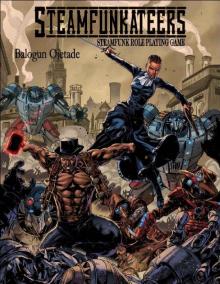 Steamfunkateers
Steamfunkateers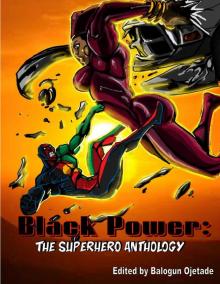 Black Power- The Superhero Anthology
Black Power- The Superhero Anthology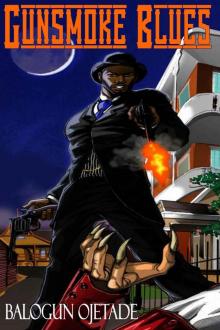 Gunsmoke Blues
Gunsmoke Blues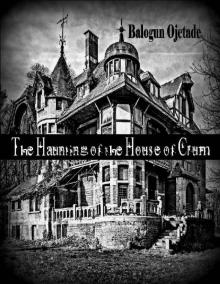 The Haunting of the House of Crum
The Haunting of the House of Crum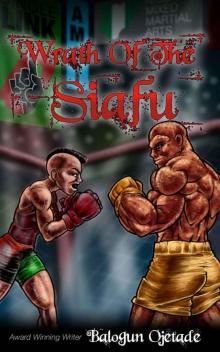 Wrath of the Siafu- A SIngle Link
Wrath of the Siafu- A SIngle Link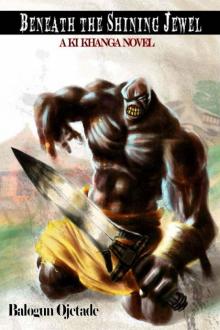 Beneath the Shining Jewel
Beneath the Shining Jewel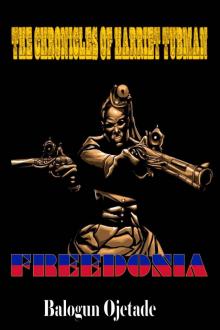 The Chronicles of Harriet Tubman- Freedonia
The Chronicles of Harriet Tubman- Freedonia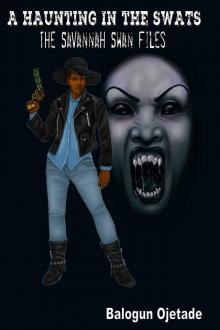 A Haunting in the SWATS (The Savannah Swan Files Book 1)
A Haunting in the SWATS (The Savannah Swan Files Book 1)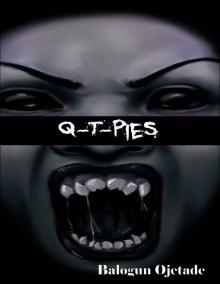 Q-T-Pies (The Savannah Swan Files Book 0)
Q-T-Pies (The Savannah Swan Files Book 0)